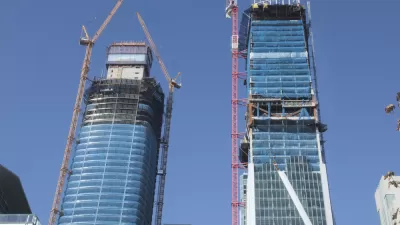In this pair of 'cause and effect' articles, USA Today reporters describe the many companies seeking new office and R&D sites in San Francisco, whether relocating from expensive downtown Palo Alto, the South or East Bay, or outside the state or U.S.
Jon Swartz and Scott Martin report from San Francisco, the new "Silicon Gate" as the print article was titled.
"San Francisco boasts the highest tech-jobs growth rate in the nation, according to real estate services firm CBRE. Current growth is about double the rate of the next two fastest-growing markets of New York City and Silicon Valley.
Its growing appeal as tech's nexus is powered by affordable office leases relative to the old Valley, favorable business taxes, and the allure of a major city."
For example, "San Francisco has vacancy rates of 9% to 10% for premium spaces that run about $50 per square foot, compared with 4.4% vacancy and $73 per square foot in Palo Alto."
"Young designers and software engineers also prefer the urban landscape, so companies are flocking to San Francisco to recruit top talent. Big and small tech companies are setting up headquarters here - Twitter, Zynga, Pinterest and Pulse, among them.
Companies are moving to San Francisco from the Valley because (their employees) don't want to be riding a Wi-Fi bus. They want to ride a bike to work," says Caroline Green, Northern California director of research for real estate firm Cushman & Wakefield. Companies "are trying to get any advantage they can - and location is a key advantage."
But what's been good for companies seeking new homes or offices has not been good for their employees, reports Martin in in the accompanying article, "San Francisco apartment rents soar as tech companies grow"
"In the past three months, average asking rents are up 12.9% from a year ago, according to market data by RealFacts. Studios now fetch over $2,100 a month here."
"San Francisco is the nation's unusually hot spot because of the tech boom, says Nick Grotjahn, spokesman for RealFacts. 'The incomes and salaries these people are making are far greater than the rest of the United States.'"
FULL STORY: San Francisco is fast becoming a technology hub

Trump Administration Could Effectively End Housing Voucher Program
Federal officials are eyeing major cuts to the Section 8 program that helps millions of low-income households pay rent.

Planetizen Federal Action Tracker
A weekly monitor of how Trump’s orders and actions are impacting planners and planning in America.

Ken Jennings Launches Transit Web Series
The Jeopardy champ wants you to ride public transit.

Driving Equity and Clean Air: California Invests in Greener School Transportation
California has awarded $500 million to fund 1,000 zero-emission school buses and chargers for educational agencies as part of its effort to reduce pollution, improve student health, and accelerate the transition to clean transportation.

Congress Moves to End Reconnecting Communities and Related Grants
The House Transportation and Infrastructure Committee moved to rescind funding for the Neighborhood Equity and Access program, which funds highway removals, freeway caps, transit projects, pedestrian infrastructure, and more.

From Throughway to Public Space: Taking Back the American Street
How the Covid-19 pandemic taught us new ways to reclaim city streets from cars.
Urban Design for Planners 1: Software Tools
This six-course series explores essential urban design concepts using open source software and equips planners with the tools they need to participate fully in the urban design process.
Planning for Universal Design
Learn the tools for implementing Universal Design in planning regulations.
Heyer Gruel & Associates PA
Ada County Highway District
Institute for Housing and Urban Development Studies (IHS)
City of Grandview
Harvard GSD Executive Education
Toledo-Lucas County Plan Commissions
Salt Lake City
NYU Wagner Graduate School of Public Service





























